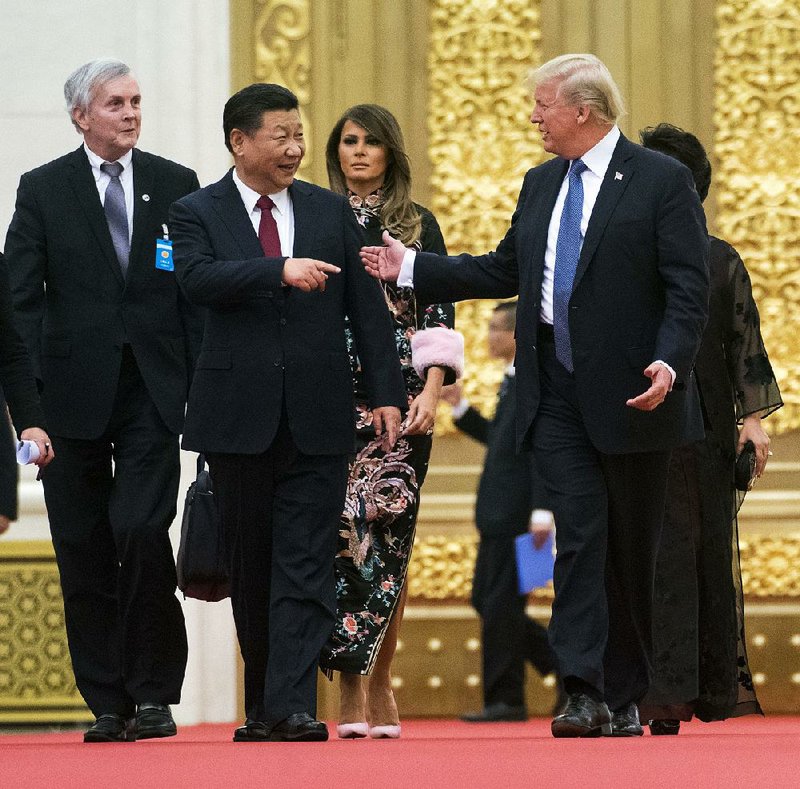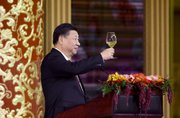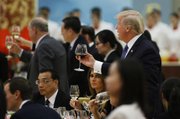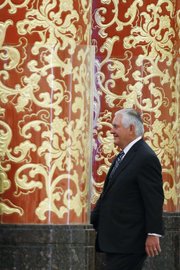BEIJING -- President Donald Trump heaped praise on President Xi Jinping of China on Thursday, saying he can't blame China for amassing a trade surplus with the United States and saying he is confident that Xi can defuse the threat from North Korea.
Trump's warm words, on a state visit to China replete with ceremony but short of tangible results, showed a president doubling down on his gamble that by cultivating a personal connection with Xi, he can push the Chinese leader to take meaningful steps on North Korea and trade.
In public, Trump projected an air of deference to China that was unusual for a visiting U.S. president. Far from attacking Xi on trade, Trump saluted him for leading a country that he said had left the United States "so far behind." He criticized the "very one-sided and unfair" relationship between the U.S. and China but said he could not blame the Chinese for taking advantage of weak U.S. trade policy.
China "must immediately address the unfair trade practices" that drive a "shockingly" large trade deficit along with barriers to market access, forced technology transfers and intellectual-property theft, Trump said.
[PRESIDENT TRUMP: Timeline, appointments, executive orders + guide to actions in first 200 days]
"But I don't blame China," he said. "After all, who can blame a country for being able to take advantage of another country for the benefit of its citizens?"
To applause, Trump said, "I give China great credit."
In a tweet Thursday, he reiterated that sentiment but added that rather than blaming China, he blames "the incompetence of past Admins for allowing China to take advantage of the U.S. on trade leading up to a point where the U.S. is losing $100's of billions."
Privately, U.S. officials said, Trump forcefully confronted Xi about the chronic trade imbalances between the two countries. He also pressed China to take tougher measures toward North Korea, including a suspension of oil shipments.
In neither case did the Chinese make significant concessions, nor did Trump express dissatisfaction with their response.
By concluding that the United States can better achieve its goals by flattering a Chinese leader than by challenging him, Trump appeared to signal a reversal of roles: The United States may now need China's help more than the other way around.
Trump marveled at the reception Xi had given him, from a full-dress military parade in Tiananmen Square to a sunset tour of the Forbidden City. He congratulated him on consolidating power at a recent Communist Party congress, declaring, "Perhaps now more than ever we have an opportunity to strengthen our relationship."
"You're a very special man," he told Xi in an appearance before reporters, at which they did not take questions.
Xi, for his part, did not return Trump's personal praise, seeming to treat him like any other U.S. leader.
"I told the president that the Pacific is big enough to accommodate both China and the United States," Xi said after reciting his well-worn line that the two countries could peacefully coexist if they respected each other's different political systems.
Trump administration officials said the leaders' exchanges had had a harder edge behind the scenes. Secretary of State Rex Tillerson told reporters that Trump had, in effect, used flattery to appeal to Xi to do more to isolate North Korea.
"Our president has been very clear with President Xi that he takes the view that, 'You are a very powerful neighbor of theirs, you account for 90-plus percent of their economic activity, you're a strong man,'" Tillerson said. "'You can, I'm sure, solve this for me.'"
Tillerson dismissed Trump's contention that trade deficits were the United States' fault as "a little bit of tongue in cheek" in the midst of a much tougher discussion. During their meeting, he said, Robert Lighthizer, U.S. trade representative, ticked off the long history of trade imbalances, and warned that they could not be allowed to continue.
Reacting from afar, Sen. Bob Menendez, D-N.J., said Trump's comments "make the United States look weak and as if we are bowing to China's whim. ... Instead of giving China credit for stealing American jobs, the president should be holding China accountable." Menendez, a member of the Senate Foreign Relations Committee, is on trial for bribery.
One tangible gain during Trump's trip was $250 billion worth of business agreements between U.S. and Chinese companies. But many of the deals are preliminary and will take years to come to fruition. They broke no new ground in areas such as technology where the United States is losing market access.
Tillerson played down the significance of any progress that was made in trade talks. "Quite frankly, in the grand scheme of a $3[00]-500 billion trade deficit, the things that have been achieved thus far are pretty small," he said.
China analysts said the deals underscored Xi's desire to give Trump a victory. "OK relations with Trump's America is very important for both Xi's glory and his strategy," said Shi Yinhong, professor of international relations at Renmin University.
Trump's conciliatory words on trade were particularly striking given his protectionist threats during the 2016 presidential campaign. At the end of his appearance with Xi, a U.S. reporter asked whether Trump still believed, as he once said, that China was "raping" the United States through unfair trade practices. Trump did not respond.
North Korea
On North Korea, the leaders' meeting brought similarly mixed results. Trump, officials said, asked Xi to cut off oil shipments, to shut down North Korean bank accounts and to send home tens of thousands of North Koreans who work in China.
North Korea has been striving to develop nuclear-tipped missiles that can hit the United States mainland. But Pyongyang has not conducted a missile test in nearly two months, which some analysts see as providing a diplomatic opening.
Tillerson acknowledged that there were differences between China and the U.S. over "tactics and the timing and how far to go with pressure" on North Korea. But he insisted that the two countries shared common objectives.
"There is no disagreement on North Korea," he said.
In a sign that China was doing something, even incremental, to curb ties, some travel agencies in the border town of Dandong were told this week to curtail their tourist business in the North.
North Korea has become a popular destination for Chinese travelers who want inexpensive foreign trips. Shutting down tours cuts off an avenue for Chinese currency for the North Korean regime, though hardly a major one.
On Saturday, the United States signaled its resolve to put military pressure on North Korea, announcing that three aircraft carrier groups would carry out large-scale naval maneuvers in the Western Pacific. At the same time, Trump seemed to accept Xi's pleas for patience.
"President Xi took that view that the sanctions are going to take a little while, that he didn't expect immediate results," Tillerson said. "In terms of how much stress it will create on them, time will tell."
Before arriving in China, Trump had delivered a stern message to Beijing, using an address in South Korea to call on China, North Korea's biggest trade partner, to do more to confront and isolate the North. But on Thursday, Trump appeared far more conciliatory.
"China can fix this problem easily. And quickly. And I am calling on China and your great president to hopefully work on it very hard," Trump said. "If he works on it hard it will happen."
Trump also was feted at a state dinner that featured a video montage of the president's visit, as well as footage of his granddaughter, Arabella, the daughter of Ivanka Trump and Jared Kushner, singing a traditional Chinese song in Mandarin.
Today, Trump is to stop in Da Nang, Vietnam, for the Asia-Pacific Economic Cooperation conference -- the first of multiple summits he'll attend on his first trip to Asia as president.
He may meet with Russian President Vladimir Putin on the sidelines of the conference. Tillerson said Thursday that the two sides were still discussing whether they had "sufficient substance" to talk about in such a meeting.
Information for this article was contributed by Mark Landler, Julie Hirschfeld Davis and Jane Perlez of The New York Times and by Jill Colvin, Jonathan Lemire, Christopher Bodeen, Darlene Superville and Ken Thomas of The Associated Press.
A Section on 11/10/2017




